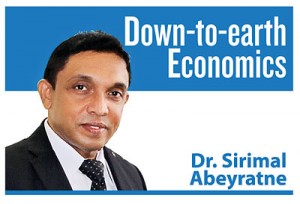“For necessary action, please”
View(s):There was a “day-care centre” to look after little children while their parents were at work. Parents used to come and drop their children at the day-care centre on their way to work every morning. In the evening, they were back to pick them up.
This particular day-care centre was faced with an irritant issue to deal with: Some parents often used to get late when they came back to take their children out.
The management had to keep the premises open and, teachers, aiders, and security guards at work, till late evenings until the last child is picked up by the parents. Frequent communications to the parents in the form of requests, advices and warnings didn’t have much effect. Parents continued to get late to pick up the kids, and came with big apologies for the delays.
The management discussed and devised a strategy, and implemented; a “fine” as the penalty for delays. The longer the delays, the higher would be the fine.
Alas! After the implementation of the penalty, the problem got worse. Parents got late even more than they used to be. They came with money to pay the fine, and picked up the kids after settling the dues. They didn’t apologise anymore because they didn’t have a sense of guilt feeling anymore.
Wrong incentives
People respond to “incentives” because their behavioural decisions are rational. An incentive carries the prospect of a reward or a punishment which encourages a person to act accordingly. Because rational people make decisions by comparing costs and benefits, they respond to incentives.
Incentives play a major role in the economy of a country. People make decisions and, thereby contributing to or obstructing the way forward, while all depends on the way that the incentive structure works. As in our opening story, wrong incentives can lead to wrong behaviour patterns.
Therefore it is of utmost importance to provide a right incentive structure for people to work. It is a matter of the “regulatory mechanism” of a country.
By introducing the above story, I thought of elaborating an important issue that impedes development of the country today: The way that our public sector operates. Obviously, as we already know, it operates in response to the “incentive structure” that is in place.

A woman walks back to her village in a distant part of Sri Lanka. Essential services often get delayed to villages like this owing to bureaucratic processes..
In order to give a glimpse of the issue, I chose to record two comments made by very senior public sector officials. They both made these comments personally and independently, when I met them on two different occasions for a brief meeting with each one of them.
Piles of files
When I entered the office room of the first official, he had huge bundles of folders laid on his large table. It was in the evening after working hours and most of the employees had already left the office.
As he saw me glancing at the loads of folders on the table, he began to explain: “Every evening, I sit here to clear all these files. It’s quite late in the night when I go home. And, by next day evening, it’s the same.”
I asked him: “Is it because of the increase in your responsibilities much more than before?”
He replied: “Not necessarily, because our areas of responsibilities are now broken into too many Ministries too, technically we should have lesser number of documents to process. I think the main reason is quite a different one: Unlike those days, now our officials don’t make decisions! They make ‘minutes on the documents’ and not the decisions, and then pass them back and forth.’
Then he laughed with me and continued: “They send the documents back asking clarifications, questions, justifications and so on. If not, they send them forward for observations, for attention, for necessary action, and so on.”
He concluded: “So finally, being the head here, all these files end up on my table!”
Minutes versus decisions
Because “making minutes versus taking decisions” has become the norm of public work, it led me to do some research on the issue. What I found was fascinating!
The number of minutes on a document reveals how inefficient the bureaucracy is. Even the decisions that are made at the end of the day, if they are actually made, they would be based on “less-informed” facts. This is because the information flow from the bottom to the top naturally becomes weaker; the top layers of a hierarchy knows much less than the lower layers.
The top level actually has to deal with the policy matters. A head of an organisation should spend more time on the “vision” of the organisation rather than on daily matters.
The “minutes on a document” are important indicators of not only the bureaucratic inefficiency, but also the character and incompetency of the officials. For instance, the minute “for necessary action, please” usually means “this is beyond my capacity”; it allows a higher authority to make the decision.
If the minute comes in the reverse direction from the higher authority to subordinates, then it is a problem of either incompetency or a tactic to avoid. In this case, obviously the subordinates get confused and wouldn’t dare to make any decision!
On time work
At the other meeting, we were chatting about the gradual decline in policy implementation efficiency of the country.
The official with whom I was having the meeting, commented: “No matter what policies are there, if there is no implementation, there is no output. Unlike those days, the public sector doesn’t work for the ‘output’; they work for the ‘procedures’. And because it has increasingly become a non-performing sector, the entire economic performance slows down.”
He continued further with his emotions and anger: “Nowadays, you try to find out which kind of work our officials attend to do efficiently and effectively. The only thing which is done ‘on time’ without any avoidance, is going abroad!”
It made me laugh, before I responded: “Obviously, otherwise you miss the flight!”
Financial performance
The inefficiency in the public sector performance is, actually reflected through budgetary performance too. For instance, even without collecting the estimated tax revenue, the government has been spending less than the estimated expenditure targets.
For instance, let us look at the “approved” and “provisional” budgetary outlays for 2018: At the end of the year, there has been Rs. 209 billion under-spending. In our history, our usual problem has been the over-spending, which has now turned out to be a problem of under-spending.
And “under-spending” is now contributed by not only the less than estimated expenditure in the capital budget, but also in the recurrent budget.
Last year the recurrent expenditure had dropped by Rs. 62 billion below the estimated amount.
As a result, achieving manageable budget deficits has become easier than ever before, and in fact, “dangerously” easier. What this weak performance in government finance is telling us is that the government’s spending capacity has been deteriorating because the public sector has become less efficient.
Problem at source
The issue that I raised is a dangerous one. If the public sector is becoming less and less efficient, the engine of growth slows down and the overall economic performance of the country deteriorates. And after all, we have already seen it over the years.
The main issue is that the system demand from the public sector is not for the “output” but the “procedures”. We have postponed public sector reforms indefinitely, but reversed in an ad hoc way by breaking down the public sector into smaller segments among too many Ministries and agencies as well as among too many national and local layers.
And, finally the incentive system is not working, because working is risky and not-working is rewarding. As long as we are not required to take “decisions”, we can make “minutes” and play the game “defensively”.
(The writer is a Professor of Economics at the University of Colombo and can be reached at sirimal@econ.cmb.ac.lk)


